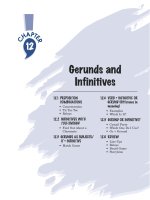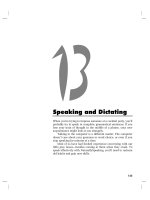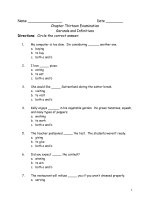Gerunds and infinitives docx
Bạn đang xem bản rút gọn của tài liệu. Xem và tải ngay bản đầy đủ của tài liệu tại đây (64.67 KB, 11 trang )
Gerunds and infinitives
THE GERUND
67 The gerund
• The gerund is used like a noun:
Smoking is bad for you.
Do you. like watching TV?
She's good at swimming.
• It is formed by adding ing to the infinitive:
go -> going
stay - staying
The negative is formed by adding not:
Would yon mind not smoking?
Note: the changes that are sometimes necessary:
lie — lying (ie —* y)
take — taking (single e: c is omitted}
sit — sitting (single vowel + single consonant — single vowel + double consonant]
Practice
67a In your notebook, write the gerund of these verbs.
do
play
travel
ride
swim
run
lie
fly
try
get
67b Fill the gaps with gerunds from the above box. Use each verb once only.
1 She likes running. every morning before breakfast.
2 After my homework, I usually watch TV.
3 I enjoy on the beach.
4 She doesn't like with other children.
5 is a fast way of
6 She likes sport, especially horses and
7 After several times, I finally passed my exams.
8 I lay in bed and thought about up.
96
Gerunds and infinitives
68 like, dislike and other verbs + gerund
• Some verbs can be followed by a gerund or a noun, including the following:
like love finish start
dislike hate stop enjoy
prefer miss give up begin
Note: like, love, prefer, and start are sometimes followed by the infinitive.
Practice
Write these sentences, changing the verbs into gerunds.
1 Do you like (make) cakes?
Do you like making cakes?
2 I dislike (get up) at seven o'clock every morning.
3 I started (work) here eight or nine years ago.
4 Do you prefer (travel) by plane or by ship?
5 I hate (write) 'thank you
1
letters.
6 I gave up (drive) after I had a bad accident.
7 I miss (be) able to visit my family.
8 I love (sit) here by the sea in the evenings.
9 I think it's time to stop (play) football.
10 What time did you finish (read) last night?
11 Why don't you like (go) to discos?
12 I think I'll start (pack) my suitcase.
97
Gerunds and infinitives
69 Prepositions + gerund
• When a verb follows an preposition, it takes the gerund:
We thought about leaving early.
1 was worried about getting home.
I'm interested in hearing more about your offer.
I'm tired of hearing Ids excuses.
After closing the door, he looked up and down the street.
Check your passport before leaving.
NOTES
• Note That to can be a preposition, or part of an infinitive:
/ decided to leave early, {to + infinitive)
I'm looking forward to seeing them again, [to + gerund)
• A gerund behaves like a noun. Where a gerund can be used, a noun can also be used.
I'm looking forward to going on holiday.
I'm looking fonvard to my holiday.
Practice
Complete these sentences, putting the verbs into the gerund and using one of the
following prepositions. Some of them are used more than once.
about of in to after
by for on at without
1 We talked about going_ (go) to France for our holiday.
2 I look forward (see) you again next year.
3 She's tired (work) for the company.
4 I'm very happy my parents
(come) home.
5 (open) the front door, I walked slowly through it.
6 We got into the house (climb) through
a window.
7 I'm looking forward (work) with you.
8 Are you interested (join) the committee?
9 I'm tired (come) to the same place every week.
10 He's very keen (swim) at the moment.
11 I'm worried Jane (get]
to the airport on time.
12 I'm not interested (hear) your excuses.
13 She's very good (listen) to what people say.
14 This is used (cut) metal.
15 The car drove off (stop).
98
Gerunds and infinitives
70 Gerunds as subjects of sentences
• Gerunds can be subjects of sentences (or objects > Exercise 67):
Smoking makes me feel sick.
Living in a foreign country can be very difficult.
Practice
Rewrite these sentences, starting with a gerund. You may need to change
some words.
1 A good way of keeping fit is to swim every day.
Swimming every day is a good way of keeping fit.
2 It takes a long time to learn a foreign language.
3 Clean the machine more often - that will solve your problems.
4 Grow your own food. It's less expensive.
5 Give up smoking: it will make you feel better.
6 It is cheaper to go by rail than by air.
7 You are not allowed to smoke here.
8 It's not very pleasant to be in hospital.
9 It's very difficult to windsurf properly.
10 It's more difficult to speak a foreign language than to read it.
11 It is forbidden to walk on the grass.
12 One thing I can't do is swim on my back.
13 It's difficult to be polite to someone you don't like.
99
Gerunds and infinitives
71 Gerunds
Check
have
move
watch
learn
study
get up
hdp
look after
smoke
say
eat
become
work
go
write
walk
live
make
see
go out
Write the verbs in the box in the correct form in these sentences. Use each verb
once only.
1 Smoking is unhealthy, but a lot of people find it difficult to stop.
2 I'm fed up with in the city - it's too dirty
and crowded.
3 1 enjoy in the garden at weekends.
4 I have decided to stop in the evenings so that I
can save some money for my holidays.
5 He's an artistic person - very good at poetry.
6 They don't like and go everywhere by car.
7 I'm not really interested in to university.
8 She's going to continue for another two years,
until her exams.
9 They're thinking of house.
10 That machine? Oh, it's used for toasted sandwiches.
11 They've given up meat.
12 Before a teacher, he worked in advertising.
13 children can be very tiring.
14 We're looking forward to you.
15 They hate early in the morning.
16 Thank you for me organize the party.
17 They're very keen on how to play chess.
18 We love parties.
19 She left without goodbye.
20 television seems to be our national sport.
100
Gerunds and infinitives
THE INFINITIVE
FORM
• Depending on the construction, infinitives are used with or without to:
It's time to go.
Did you. see the accident happen?
72 to + infinitive after certain verbs
• Certain verbs take the infinitive.
/ want to stay.
We decided to wait for the bus.
Note the negative:
We decided not to wait for the bus.
Practice
Complete the sentences, using a verb from the box. Use each verb once.
help
speak
buy
get on
stay
look after
find
telephone
go out
1 We decided .to go. to Spain for our holidays.
2 She learnt Arabic when she was a child.
3 I tried you but there was no answer.
4 They refused the plane.
5 She hopes a job soon.
6 Did you forget the bread?
7 I'm tired: I don't want tonight.
8 They offered the children for the evening.
9 They're planning with us for the weekend.
10 He agreed us with our problem.
101
Gerunds and infinitives
73 to + infinitive to express purpose
• to + infinitive is used to express purpose:
I came here to see you.
I went to London to study English.
I drove to the airport to meet my parents.
Practice
Express each question and answer as one sentence, using to + infinitive.
Note that you will need to change some words.
1 Q: Why do you go to the beach every weekend? -
A: Because I like swimming.
She goes to the beach every weekend to swim.
2 Q: Why did you move to London?
A: I wanted to find work.
He
3 Q: Why are you leaving home?
A: I'm going to university in Birmingham.
She
4 Q: Why are you having a party?
A: It's my thirtieth birthday, and I want to celebrate it.
He
5 Q; Why do you get up at six every morning?
A: I do my training then.
She
6 Q: Why are you going out?
A: I want to post a card to my mother.
He
7 Q: Why are you saving money?
A: We want to buy a car.
They
102
Gerunds and infinitives
8 Q: Why are you going to Egypt?
A: We want to visit Ali's parents.
They
9 Q: Why did you buy a new suit?
A: 1 want to wear it at the office party.
He
10 Q: Why did you buy a video recorder?
A: We want to record the World Cup Final.
They
74 in order to + infinitive, so as to + infinitive to express purpose
In order to + infinitive and so as to + infinitive are also used to
express purpose.
• in order to + infinitive, can be more formal than to + infinitive:
In order to qualify for the award, you should be under twenty-five.
• in order to + infinitive and so as to + infinitive are more common than to +
infinitive before verbs like be, have, and know:
I got up early so as to be ready for John's phone call
• To express a negative purpose, in order not to + infinitive and so as not to
+ infinitive are more common than not to + infinitive:
He opened the door quietly so as not to disturb the baby.
Practice
Rewrite these sentences without changing their meaning, using the words in
brackets. You will need to omit some words, and you may need to change the
word order.
1 She put the letter in her bag because she didn't want to lose it. (so as)
5he put the letter in her bag so as not to lose it.
2 You should book your tickets early if you want to avoid disappointment.
{in order to}
You should book your tickets early in order to avoid disappointment.
3 I'll leave work at 4.30 so I won't be late, (so as)
4 Everybody stopped talking because they wanted to hear her sing.
103
Gerunds and infinitives
(in order)
5 I need to watch you so T can understand what you are doing on the
computer, (in order)
6 If you want to pass the exam, you will need to study very hard, (in
order)
7 We don't want to waste any time, so let's start the meeting now. (so as)
8 They moved out of the city because they wanted to have a quieter life,
(in order)
9 Keep the CD in its case. Then you won't damage it. (so as)
10 He waited outside the house because he wauled to see her when she
came home, (so as)
104
Reported speech
There are two ways of reporting what a person says:
Direct speech
He said, 'I'm going home.'
'I'm going home,' he said.
Indirect speech
He says he's going home.
He said he was going home.
DIRECT SPEECH
75 Writing direct speech
She said, 'My name's Stella.
'My name's Stella,' she said.
• Direct speech reports the exact words the speaker says. Put quotation marks
(' ') before and after the speaker's statement.
Notes
The speaker's statement always starts with a capital letter.
she said can go heforc or after the statement, but is separated from it by a comma (J.
Commas and full stops after the statement go inside the quotation marks.
Question marks go inside the quotation marks.
Question marks are not followed by a comma:
are you?' she said.
105
Reported speech
Practice
75a Put the sentences below into direct speech, using the words given.
1 the bus driver
The bus driver said, 'We're late.'
2 the little boy
3 Jane
5 the old man
106
4 the policeman









